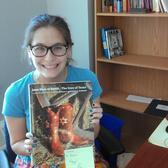Bella and Esther: If You've Got It, Flaunt It
How did Esther and Bella Abzug make change in their communities? How have Jewish women used costumes to help them achieve their goals? What can these stories teach us about gender and Judaism today?
In our most recent online learning program, Jewish educators from across the country explored these questions. As JWA’s Education Program Assistant (and a Jewish educator myself), I look forward to finding ways to highlight great women and their stories to use in my classroom, as well as to share them with people who might not know about them.
While the connection between the Purim story and Bella Abzug might not be immediately apparent, with proper examination it’s delightfully obvious. Both Esther and Bella were bright and intelligent women who used their outward appearances for the greater good. Esther used her beauty to win the king and save the Jews of Persia, and Bella wore hats and gloves to give an air of professionalism in a male-dominated political world. Once they had the attention of those in power, Esther and Bella moved the focus away from their looks and onto the issues at hand. For Esther, that was preventing the murder of hundreds of Jews; for Bella, it was fighting for civil and women’s rights around the world.
One might argue that discussing women’s outward appearances and their impact on power can have a negative affect on young people. After all, aren’t we constantly being told that looks don’t matter and beauty is only skin deep? In our online program we discussed whether Esther and Bella were manipulative or strategic. We ultimately came to the conclusion that manipulation isn’t necessarily evil; Bella and Esther used their appearance strategically, for good causes. We may not like to admit it, but how we present ourselves to others is crucial. In the early days of her legal career, Bella Abzug would show up to a hearing or meeting only to be ignored because people thought she was a secretary. She discussed her solution to the problem in an interview, saying, “In those days professional women wore hats–and gloves, so I put on gloves and a hat. And every time I went anywhere for business, with the hat and gloves, they knew I was there for business.” In our own lives, we choose different outfits for different occasions. For instance, as I’m typing this blog post, I’m working from home in a t-shirt and my favorite overalls. Would I wear this outfit to the office? Not a chance–when I’m at work, I want to let my professionalism shine not only through my actions, but through my work-appropriate attire. Bella did that with her hats, just as Esther did by wearing clothing fit for a queen.
We also talked about Vashti during the program. Some might say that Vashti is not such an important character in the Purim story. There are even those who wouldn’t want Vashti mentioned at all. These people might say she’s disobedient and clearly not the shining example that Esther is shown to be. And to this I say, “Are you kidding me? I want a whole spin-off on Vashti’s story! The king was a misogynistic jerk, commanding Vashti to parade in the nude before his court, and her response was rebellion. Shouldn’t this be seen as a positive example to women?” Vashti is such an exciting example of a powerful and independent woman. My hope is that teachers and students will not write off Vashti as a secondary character, but see her as a revolutionary and maybe even an early feminist.
While I’m frustrated that Women’s History Month is necessary (I tend to agree with the recent blog post by Eva Bilick), we ought to use it to teach students and each other about how we can make positive change in our communities. I feel so fortunate that I have such incredible role models (or “possibility models,” as Etta King, JWA's Education Program Manager, likes to say!), both biblical and historical, to share with my students and with the world.








A friend of mine still in high school, a Modern Orthodox day school, told me that one of her teachers taught the class about Vashti in a positive light. I was pleasantly surprised to hear that she's begun to be reclaimed within Modern Orthodox circles that aren't explicitly feminist.
In reply to <p>A friend of mine still in by Talia bat Pessi
How fantastic! Thank you for sharing, Talia. I sure hope Vashti will continue to be reclaimed by educators in all denominations of Judaism, feminist or otherwise.